
Adam and Thomas, two nine-year-old Jewish boys who survive World War II, take refuge in the forest where they learn to forage and survive, soon meeting and helping other fugitives fleeing for their lives.
Featured in WOW Review Volume XIII, Issue 3.

Adam and Thomas, two nine-year-old Jewish boys who survive World War II, take refuge in the forest where they learn to forage and survive, soon meeting and helping other fugitives fleeing for their lives.
Featured in WOW Review Volume XIII, Issue 3.

A young disabled girl and her brother are evacuated from London to the English countryside during World War II, where they find life to be much sweeter away from their abusive mother.
See the review at WOW Review, Volume 8, Issue 4
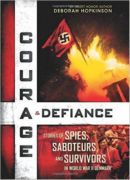
“Critically acclaimed Sibert Honor author Deborah Hopkinson brings to bold life the remarkable story of the Danish resistance and rescue of over 7,000 Jews during WWII. When the Nazis invaded Denmark on Tuesday, April 9, 1940, the people of this tiny country to the north of Germany awoke to a devastating surprise. The government of Denmark surrendered quietly, and the Danes were ordered to go about their daily lives as if nothing had changed. But everything had changed. Award-winning author Deborah Hopkinson traces the stories of the heroic young men and women who would not stand by as their country was occupied by a dangerous enemy. Rather, they fought back. Some were spies, passing tactical information to the British; some were saboteurs, who aimed to hamper and impede Nazi operations in Denmark; and 95% of the Jewish population of Denmark were survivors, rescued by their fellow countrymen, who had the courage and conscience that drove them to act. With her talent for digging deep in her research and weaving real voices into her narratives, Hopkinson reveals the thrilling truth behind one of WWII’s most daring resistance movements”–

A nine-year-old Jewish girl, helped by Irena Sendler and the Zegota organization, is smuggled out of the Warsaw ghetto, given a new identity, and sent to live in the countryside for the duration of the World War II.

Making a birthday card in Auschwitz was all of those things. But that is what Zlatka did, in 1944, for her best friend, Fania. She stole and bartered for paper and scissors, secretly creating an origami heart. Then she passed it to every girl at the work tables to sign with their hopes and wishes for happiness, for love, and most of all—for freedom.
Fania knew what that heart meant, for herself and all the other girls. And she kept it hidden, through the bitter days in the camp and through the death marches. She kept it always.
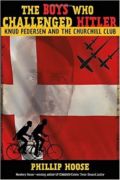
At the outset of World War II, Denmark did not resist German occupation. Deeply ashamed of his nation’s leaders, fifteen-year-old Knud Pedersen resolved with his brother and a handful of schoolmates to take action against the Nazis if the adults would not. Naming their secret club after the fiery British leader, the young patriots in the Churchill Club committed countless acts of sabotage, infuriating the Germans, who eventually had the boys tracked down and arrested.
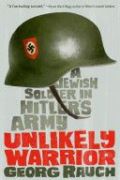
As a young adult in wartime Vienna, Georg Rauch helped his mother hide dozens of Jews from the Gestapo behind false walls in their top-floor apartment and arrange for their safe transport out of the country. His family was among the few who worked underground to resist Nazi rule. Then came the day he was drafted into Hitler’s army and shipped out to fight on the Eastern front as part of the German infantry—in spite of his having confessed his own Jewish ancestry.
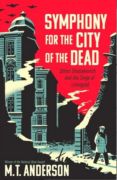
In September 1941, Adolf Hitler’s Wehrmacht surrounded Leningrad in what was to become one of the longest and most destructive sieges in Western history—almost three years of bombardment and starvation that culminated in the harsh winter of 1943–1944. More than a million citizens perished. Survivors recall corpses littering the frozen streets, their relatives having neither the means nor the strength to bury them. Residents burned books, furniture, and floorboards to keep warm; they ate family pets and—eventually—one another to stay alive. Trapped between the Nazi invading force and the Soviet government itself was composer Dmitri Shostakovich, who would write a symphony that roused, rallied, eulogized, and commemorated his fellow citizens—the Leningrad Symphony, which came to occupy a surprising place of prominence in the eventual Allied victory.
See the review at WOW Review, Volume 8, Issue 4
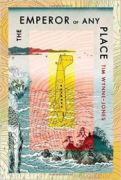
When Evan’s father dies suddenly, Evan finds a hand-bound yellow book on his desk—a book his dad had been reading when he passed away. The book is the diary of a Japanese soldier stranded on a small Pacific island in WWII.
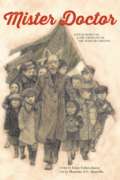
November 1940. A circus parade walks through the streets of Warsaw, waving a flag and singing. They are 160 Jewish children, forced by the Nazis to leave their beloved orphanage. It’s a sad occasion, but led by Doctor Korczak, their inspirational director, the children are defiantly joyful. Their new home is in the ghetto, a prison for Jews. Day by day, more people arrive. Some are forced to live on the street and freeze to death. Others die of disease and starvation. Though they lack food, warmth, and freedom, the children’s spirits are sustained by the steadfast respect and kindness of “Mister” Doctor. But these children will never grow up: in August 1942, they board the train that will carry them away to the death camps. Offered his freedom, Doctor Korczak refuses to abandon the children and proudly joins them on their last journey.